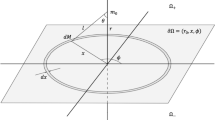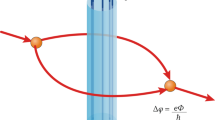Abstract
PROF. A. H. COMPTON'S own explanation of the remarkable phenomenon discovered by him is well known and is set out very clearly in his recent book on “X-rays and Electrons.” Briefly, it is that radiation is of a corpuscular nature, that the momentum of the impinging quantum detaches the electron from the atom and causes it to recoil, while the deviated quantum loses energy in the process and degrades in frequency. This view of the Compton effect, like Einstein's explanation of the emission of photo-electrons, approaches the relations between matter and radiation from a point of view so divergent from that of the familiar concepts of Maxwellian electro-dynamics, that it is scarcely possible to understand how this conception of radiation is physically reconcilable with the familiar explanations of interference and diffraction phenomena.
This is a preview of subscription content, access via your institution
Access options
Subscribe to this journal
Receive 51 print issues and online access
$199.00 per year
only $3.90 per issue
Buy this article
- Purchase on Springer Link
- Instant access to full article PDF
Prices may be subject to local taxes which are calculated during checkout
Similar content being viewed by others
Author information
Authors and Affiliations
Rights and permissions
About this article
Cite this article
RAMAN, C. Thermodynamics, Wave-theory, and the Compton Effect. Nature 120, 950–951 (1927). https://doi.org/10.1038/120950a0
Issue Date:
DOI: https://doi.org/10.1038/120950a0
Comments
By submitting a comment you agree to abide by our Terms and Community Guidelines. If you find something abusive or that does not comply with our terms or guidelines please flag it as inappropriate.



